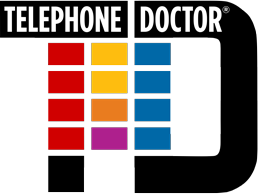By Nancy Friedman, The Telephone Doctor
If your job entails taking calls from unhappy, irate callers, you’ve got your work cut out for you. Employees who deal with callers are especially vulnerable to outbursts from customers who are going through an emotional, stressful time.
Handling this type of customer takes time and training, but it can be accomplished effectively. Here are some of the Telephone Doctor’s best techniques for turning unhappy callers into satisfied customers.
Get Off on the Right Foot
Realize that upset angry customers are not unhappy with you, but with the situation. Don’t take a caller’s hostility personally. You are merely the rod that redirects the violent lightning. You can do a great deal to diffuse a caller’s anger before you ever pick up the phone. How? By smiling before you answer that call. You can really “hear” a smile over the phone. It’s very difficult to be rude to someone who is warm and friendly.
Anatomy of a Hostile Call
There are four basic steps to handling an irate caller. Telephone Doctor calls them our ASAP techniques.
A – Acknowledge the person’s feelings and apologize for the inconvenience the customer has encountered. Make an effort to be sincere. In today’s impersonal society, it’s incredibly rare to hear the words, “I’m sorry that happened. Let me get the ball rolling to fix it.” You’ll probably spend about 80 percent of your time massaging the caller’s feelings and 20 percent actually solving the problem.
S – Sympathize and empathize with the caller. Phrases like “I can understand why you’re upset” can help soothe ruffled feathers. Pretend it’s you calling. Then get busy solving the problem.
A – Accept 100 percent responsibility for the call. This is probably the toughest part. Chances are excellent that you had nothing to do with the problem. However, it’s your job to take the responsibility and help initiate a solution.
P – Prepare to help. Begin by re-introducing yourself – callers don’t usually remember your name. State that you will be able to help. Use the caller’s name, if possible. This helps to diffuse anger. A willing attitude is essential, because if the caller senses insincerity or indifference, it will cause them to stay angry. It’s exasperating to file a complaint with someone who obviously doesn’t care.
Excuses
Never make an excuse to a complaining caller. No one wants to hear “The computer is down” or “I’m the only one here.” That is your problem, not the caller’s. When you give an excuse, the caller automatically hears “I’m not going to help you”
Transferring Calls
Sometimes you’re not able to solve the problem on the spot. Many times you need more information from another department. Perhaps the call needs to be handled by another person. Although these are legitimate courses of action, they usually upset your caller all over again.
If you need more information, TELL the caller. Ask them if they’re able to hold while you obtain it, or would they prefer a call back. “Joe, I need to check with our claims department in order to answer your question. It will take two or three minutes, are you able to hold/wait while I check?” Avoid untrue, frustrating phrases like “Hold on a second.” Nothing takes a second.
If you need to transfer a caller, if you can, let them know the name of the person they’ll be speaking with. It’s also good to explain a reason why you’re bringing in a third party. “Joe, Mrs. Smith in our claims department is the real expert in resolving your type of situation. May I transfer you directly to her?”
The ASAP technique works! Try it and see!
# # #
Nancy Friedman, president of Telephone Doctor, is a keynote speaker at association, franchise and corporate meetings. She is the author of eight books on customer service and sales, has appeared on Fox News, CNN, Oprah, and dozens of other radio and TV shows. You can talk with Nancy at 314-291-1012, email her at nancy@telephonedoctor.com or visit www.nancyfriedman.com.
